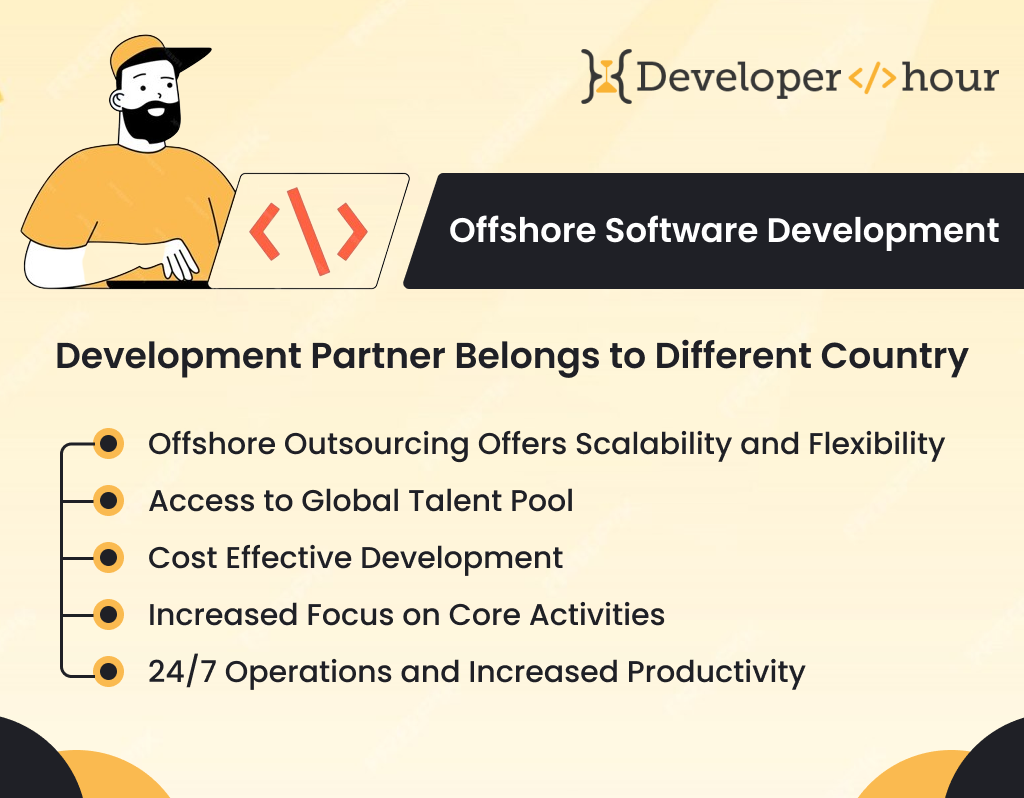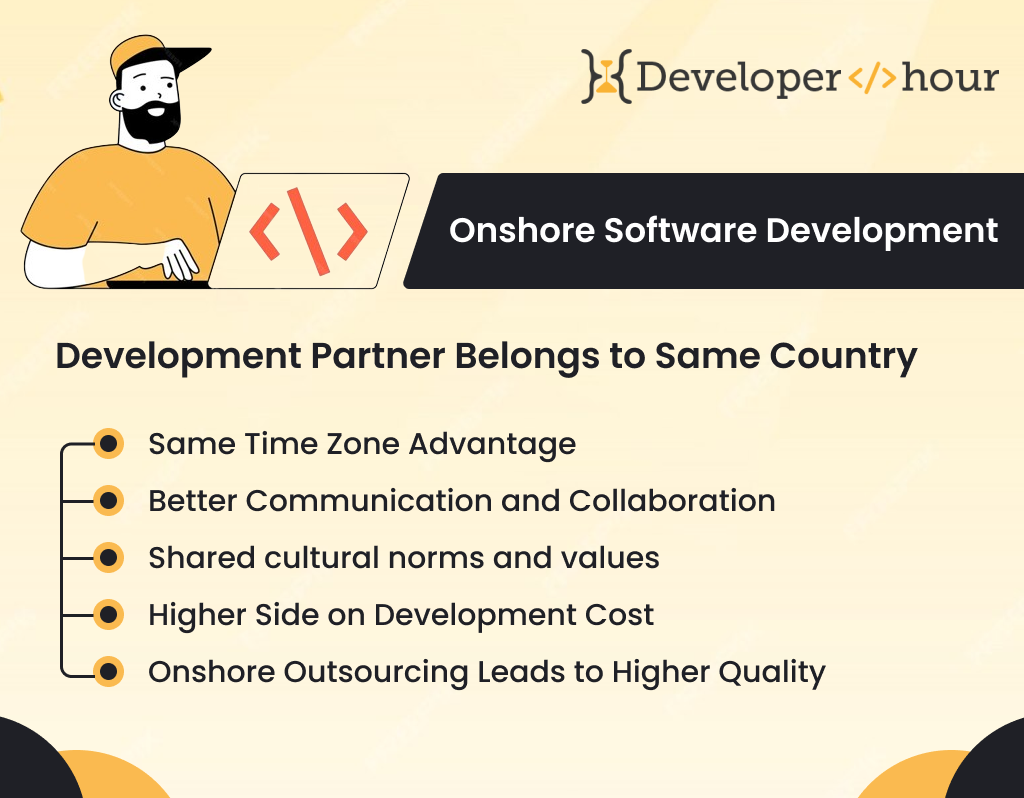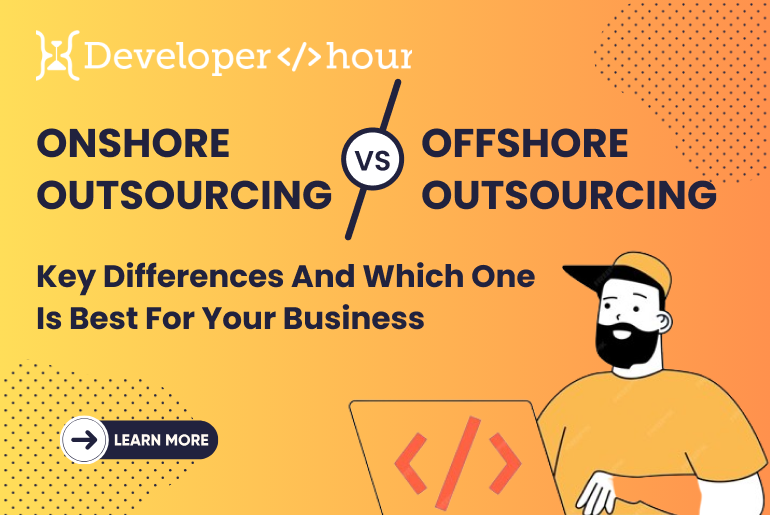Do you know the IT outsourcing market is expected to grow to US$512.50 bn in the present year? This evolving market is projected to be US$777.70 billion by 2028 at a CAGR of 10.99%. Yes, you read it right. There is a huge chance that the IT outsourcing industry will evolve more over the passing years. If you are also considering outsourcing software development services, you must decide Onshore vs offshore software development, which one would you prefer?
Whether it is onshore vs offshore development, you must decide your team of experts carefully. We have curated a guide below to answer many of your questions so that you can go for onshore or offshore development easily. Here, we have elucidated everything you need to know about acquiring offshore and onshore software development, including their pros and cons.
Overview – onshore vs offshore development
To elevate your business and its operations, there are various tough choices to make by ventures, and choosing onshore vs offshore development is one of them. These are two different approaches to hiring a dedicated development team to complete your project, and it can be within or outside the country. When we talk about onshore development, it comes with collaborating with experts within the same country as clients, leading to cultural alignment, easier monitoring & communication, and better outcomes.
On the other hand, offshore development enables businesses to go overseas to find a suitable team of software developers aligned with their specific requirements at lower hiring costs. Though it is cost-effective, but it comes with several challenges such as language barriers, slow response time, time zone variations, and cultural gradations. Ultimately, it depends on the client, which one they choose as per their requirements, budget constraints, and other aspects.
- Overview – onshore vs offshore development
- Key Takeaways and Stats Onshore VS Offshore Software Development to Consider
- Onshore VS Offshore Software Development Outsourcing Model- A Quick Guide
- What is Onshore Software Development
- Difference Between Onshore vs Offshore Software Development
- Things to Consider When Choosing Between Onshore and Offshore Development
- Onshore vs Offshore: Which One You Should Choose?
- Why Developerperhour as Your Offshore Development Partner?
- FAQs – Onshore Vs Offshore Development Outsourcing
Key Takeaways and Stats Onshore VS Offshore Software Development to Consider
- The worldwide revenue of the IT outsourcing market is predicted to increase continuously between the years 2024 and 2028 by US$265.3 billion.
- ITO (Information Technology Outsourcing) delivers a wide range of services such as application services, IT-reliant business procedures, and infrastructure solutions using the best service providers.
- Most of the revenue of the IT outsourcing market is generated in the USA which is about US$185.50bn in 2024 while comparing worldwide.
- Outsourcing helps in providing high-quality, scalable, and inexpensive solutions to streamline business processes.
- Outsourcing software development facilitates businesses with faster time-to-market and accelerates software development processes.
- The average spend of an employee is forecasted to be valued at US$146.10 in the IT outsourcing market in the year 2024.
- The reason behind the increasing demand for outsourcing development services is the inclusive scarcity of dedicated and talented IT professionals.

Onshore VS Offshore Software Development Outsourcing Model- A Quick Guide
When you decide to outsource the software development services, now it’s time to choose between Onshore and Offshore development services. It’s a common impasse many businesses face while requiring a premium-quality solution without impacting their budget.
But you must consider that both outsourcing models have their own pros and cons that will directly impact your overall planning. Hence, to make the right decision, dive deep into the details below that will give you a clear idea of which model you should go for.

What is Offshore Software-Development
Offshore development or offshore outsourcing refers to the process of hiring an offshore development company or developers outside of the country you are living in. Mainly, businesses prefer to have a reduced cost of software development. From Offshoring, clients get facilitated with large sets of skilled experts and lower labor costs. While obtaining offshore development services, businesses must align their time zone with the hired team’s time zone to initiate a constant workflow and smooth communication.
Countries like India, the USA, the UK, South Africa, etc. are some of the considerable outsourcing markets for businesses to acquire feature-rich and quality solutions.
Pros/Advantage of Offshore Development
- The main benefit of having offshore development services is lower development costs. Businesses can go for countries with lower hiring costs to get efficient solutions.
- In offshore development, ventures have the advantage of searching for the most suitable according to their project requirements amidst a global pool of talent. They can have professional developers with exceptional skills and experience.
- Associating with global offshore developers facilitates businesses to enter the international market to elevate their reach and lead a strong global presence.
- The difference in time zone enables businesses to have a faster time-to-market as when their hired onshore development team finishes the work, the offshore team can pick up from there, projecting rapid development.
- The offshore development team empowers businesses with round-the-clock support and maintenance services to provide fast solutions and constant assistance using the advantage of different time zones.
Cons/Disadvantages of Offshore Development
- Every country has its own language, and while going for offshore software development services, it can be a barrier for businesses as they can find difficulty in conveying the right instructions.
- Quality control and real-time alliance are also some of the nuances leading to poor code quality, misunderstandings, and lack of integration of the right functions.
- Cultural dissimilarity is one of the factors digging out huge gaps in team collaboration, working procedure, understanding, and overall communication.

What is Onshore Software Development
Onshore software development depicts the approach to hiring software developers within the same country or region you are living in. However, it limits the search for skilled experts by businesses but facilitates them by sharing the same environment, work style, culture, language, and time zone. Onshore outsourcing development is considered the nearest option geographically preferred by businesses when they are out of staff or have a scarcity of specific developers.
It is most appropriate for businesses that need location-specific expertise as it leads to less inconvenience compared to offshore development. Also, if a project requires face-to-face interaction, onshore outsourcing should be your ideal option.
Pros/Advantage of Onshore Software Development Outsourcing
- Onshore development is perfect for intricate projects demanding real-time communication and collaboration, resulting in the rapid development process and transparency.
- Cultural alignment is the top benefit of onshore development, along with shared time zones, language, on-site visits, face-to-face meetings, no language restrictions, and minimum delay in the process.
- In the onshore outsourcing services, both parties follow the same legal procedures making the process and contract easier to accept. It helps clients to get higher security of their confidential data and sensitive information while assuring the safety of their intellectual property.
- With this approach, it is easier for clients to monitor the software development process while ensuring its quality. Though specific domain expertise and knowledge are always considered in onshore development, continuous monitoring can bring astounded results.
- This type of outsourcing facilitates clients with high flexibility comprising faster response time, face-to-face collaboration, scalability, and many more to ensure meeting all the requirements of clients.
Coss/DisAdvantage of Onshore Software Development
- Onshore outsourcing costs more than offshore outsourcing because of aspects such as higher operational costs, labor expenditures, and higher living standards. If you hire onshore outsourcing developers in developed countries, the higher cost can have a great impact on the overall project.
- Hiring within the same country or region limits the search for skilled resources for modern-edge or specialized technologies. It also projects delays in the recruitment process and possible challenges in finding the right experts aligned with project requirements.
- Onshore development has less flexibility in terms of providing 24*7 support services specifically in the case of global projects requiring faster response time, easy coordination, and collaboration.

Difference Between Onshore vs Offshore Software Development
Onshore vs offshore development is considered two different models for managing and developing software projects. Here, we are depicting an enduring assessment requiring a comprehensive understanding of your business needs. To choose the right approach, take the below key differences into account. Have a look at this breakdown-
Geo Location
Offshore Outsourcing- In the offshore outsourcing model, the location of the client and service provider is different. Most businesses go for locations where the hiring cost of developers is lower compared to other areas.
Onshore Outsourcing- In this outsourcing model, ventures prefer hiring software developers from the same country they are living in. While hiring experts within the same location, there is no specific norm of geographical distance between resources and clients.
Cost Comparison
Offshore Outsourcing- The main benefit of offshore outsourcing development is that it facilitates businesses with minimum wages along with the ease of finding skilled resources in regions with a lower living cost.
Onshore Outsourcing- Whenever it comes to software development, having the lowest cost is the top concern of businesses. Hence, it would be difficult for the Onshore outsourcing model to compete with the offshore outsourcing model due to the higher wages applied in the same country. However, it can be compensated easily via getting other benefits such as easy communication, high quality, less travel expenses, and others.
Cultural Compatibility
Offshore Outsourcing- Going for offshore outsourcing requires cross-cultural understanding and conversion for seamless communication and collaboration. Here, cultural modifications can have a direct impact on the overall work integrities, hence you need to consider this option prudently.
Onshore Outsourcing- Cultural compatibility is one of the highly considerable aspects of efficient collaboration. Onshore development aligns perfectly with this requirement as it has shared communication styles, cultural standards, and business practices within a similar country.
Time Zone Difference
Offshore Outsourcing- Due to the distant time zones, the Offshore outsourcing model requires better time management and on-time meeting arrangements. Apart from this, it comes with the advantage of providing round-the-clock support, boosting the project turnaround time.
Onshore Outsourcing- There is no difference in time zone; therefore, the development team is always available to communicate leading to quick issue resolution and better decision-making. But there is a lack in providing continuous support due to fixed working hours.
Language Barrier
Offshore Outsourcing- Before going for an offshore outsourcing model, you need to develop an understanding of specific languages so that you can communicate better with the hired resources. Otherwise, it can lead to miscommunication while guiding the project resulting in poor quality and slow development.
Onshore Outsourcing- There is no language barrier in Onshore outsourcing as the team shares similar language and working style with the client alleviating confusion and encouraging unified collaboration.
Skills & Expertise
Offshore Outsourcing- If you are going to hire an offshore outsourcing model, you have wide access to a global pool of talented resources. You can hire among them based on their skills, expertise, and experience according to your project while considering the hiring cost.
Onshore Outsourcing- Onshore outsourcing services enable businesses with localized resources with an understanding of a specific domain or technology. Hence, finding experts with niche expertise might be more challenging in comparison to Offshore outsourcing.
Things to Consider When Choosing Between Onshore and Offshore Development
In the domain of software development, the onshore vs offshore software development can make your decision to choose one extremely difficult. Onshore development empowers businesses with smooth and real-time communication, proximity, etc. but with a higher cost comparatively, on the other hand, offshore development encompasses lower cost efficiency with talented resources from different regions, but you must face possible differences in culture, time zone, and languages.
Thus, to solve your dilemma between selecting onshore and offshore development outsourcing models, you need to have a look at the below aspects that will help you to make an improved decision-
Project Intricacy
To choose the best between Offshore VS onshore development, you can consider the level of project complexity. If you have a project with intricate requirements and need real-time interaction and discussion, you must go with the onshore development. In contrast, if your project can handle delays in communication due to time zone differences, offshore development is also an ideal option to choose.
Budget Limitations
Budget constraints are the most considerable factor that will directly affect your decision to choose onshore and offshore software development. Onshore development incorporates higher costs because of operational expenditures and higher wages. While offshore development provides benefits like lower costs with premium work quality. It enables businesses to assess a vast pool of talent by comparing their costs leading to utmost flexibility.
Skills Requirement
While comparing between onshore VS offshore development in terms of hiring skilled resources, the offshore model offers access to a wide group of experts, most suitable for particular niche requirements guaranteeing better quality solutions. When it comes to onshore development, it might face expertise constraints due to geographical limitations affecting ideal results.
Project Timeline
Project timeline plays a vital role in deciding between onshore and offshore outsourcing models. Onshore software development includes fixed working hours, better understanding & communication, but still processes slowly and gradually. While in Offshore development, it facilitates ventures with prolonged working hours. It leverages fast decision-making and consistent progress making it an appropriate option for projects with strict timelines.
Project Management
Full control over the project assures the client about the project’s quality. Offshore development lacks smooth communication and collaboration leading to less client control. On the contrary, Onshore development leverages real-time feedback and changes and face-to-face interactions to fill the gaps and encourage better orientation.

Onshore vs Offshore: Which One You Should Choose?
While discussing Onshore and offshore software development, the offshore outsourcing model seems a better option. As mentioned in the above article, offshore development eases businesses with multiple benefits such as lower development costs, extended work hours, efficient and expert developers, and many more if you can manage reduced control over the project.
But before choosing any of them, you must consider your project requirements as Onshore development can also be an ideal choice when expertise, real-time communication, and quality control are topmost concerns. It will be easier to choose between both of them when you have a good understanding of project execution, management, and expected results.
At last, Onshore development can be your go-to choice as higher quality and real-time alliance can easily outweigh the higher financial costs. While in Offshore development, selecting if your project requires better scalability and lower labor costs would be good. Hence, choose wisely.
Why Developerperhour as Your Offshore Development Partner?
Outsourcing with Developerperhour will enable you to experience higher flexibility. You don’t need to be stressed about the project management, updates, or quality, as our expert developers will handle everything. Being a top offshore development company, we boast a team of talented in-house dedicated developers with years of experience and advanced technical skills to deliver you with an exceptional bespoke software solution.
Therefore, if you need assistance outsourcing your software development project, we are here to help you with appropriate software outsourcing options. Contact us anytime, and we will assist you happily.
FAQs – Onshore Vs Offshore Development Outsourcing
Choosing between offshore and onshore development completely depends on the business requirements. First, analyze the pros and cons of both and then, choose which outsourcing model aligns best with your specific needs. Also, consider factors like budget constraints, expertise, language, work style, cultural fit, and others to make an informed decision about your outsourcing partner.
Offshore meaning leads to outsourcing your software development project to a firm in another country or region. Businesses prefer this outsourcing model due to the lack of talented resources or talent scarcity in specialized technologies. There are some other considerable factors, including lower costs, round-the-clock support, higher expertise, etc.
There is a wide range of differences between onshore and offshore software development services, considering dynamics such as project complexity, requirements, time zones, communication barriers, level of required collaboration, and cultural variances. Offshore is considered way more affordable than onshore development, along with far-reaching access to specialized talent. On the other hand, onshore development comes with higher costs, cultural similarity, improved communication, and easy collaboration. Go for the one aligned best with your budget and business necessities.
Onshore development enables businesses with multiple benefits such as fewer communication obstacles, easier communication & meetings, the same legal procedure to follow, cultural compatibility, time zone & proximity alignment, risk management, assurance of quality & expertise, and many others.




